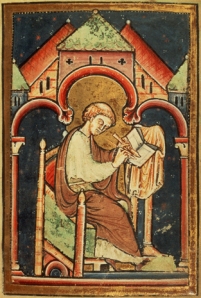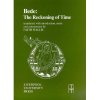 One of the gems in the new edition of Bede’s On the Nature of Things and On Time, is the first translation and publication of Bede’s cosmology hymn. It doesn’t appear to have a very set title. Wallis and Kendall refer to it as the ‘Hymn of the Six Ages’, but the edition actually titles it the ‘Hymn of the Work of the Six Days of Creation and Six Ages of the World’. Descriptive but not very catchy. Derek over at St Bede’s Breviary may be interested to know that Wallis and Kendall assert that this hymn is the only one of Bede’s hymns written for the daily office.
One of the gems in the new edition of Bede’s On the Nature of Things and On Time, is the first translation and publication of Bede’s cosmology hymn. It doesn’t appear to have a very set title. Wallis and Kendall refer to it as the ‘Hymn of the Six Ages’, but the edition actually titles it the ‘Hymn of the Work of the Six Days of Creation and Six Ages of the World’. Descriptive but not very catchy. Derek over at St Bede’s Breviary may be interested to know that Wallis and Kendall assert that this hymn is the only one of Bede’s hymns written for the daily office.
Bede’s hymns are poems that were sung. There his no indication of a chorus. We know he modeled his poetry on the many forms of hymns found in psalms.
This poem has 28 stanzas that together wrap up Bede’s views of the “ages of fleeting time”. There are 6 pairs of stanzas that link a day of creation with an age of time with four stanzas for the sixth day/age. There are introductory stanzas and descriptions of two ages to come. Here are perhaps the critical four stanzas (13-16):
On the sixth day was created
Man, who, displaying
The image of his Creator
Would live blessed forever.
The most high Creator of all,
By whom man was created
In the Sixth Age was created
A man, the Son of God.
As he sleeps, the splendid
Wife of Adam is formed,
Obtaining bone from his bones,
Flesh from his flesh.
Now the splendid bride is born
To Christ from his very flesh
And by the mystery of his blood
as he sleeps on the cross.
The bride is of course the church, known from ancient times as the body of Christ. Its not very easy to see Bede’s poetic patterns here in part because it was written in Latin. Kendall and Wallis assure us that the pattern is also found in some of Bede’s other genuine poems and fits within classical iambic dimeters. Bede’s style fits within what he described in his The Art of Poetry.
Reference:
Kendall, Calvin B and Wallis, Faith. (2011). Bede: On the Nature of Things and On Times. Translated Texts for Historians Series. Liverpool University Press.

 Yesterday and today have been a days of mixed news, but one of the bright spots what that my copy of Bede’s On Genesis arrived yesterday. Yippee! It feels like I’ve been waiting for it for years.
Yesterday and today have been a days of mixed news, but one of the bright spots what that my copy of Bede’s On Genesis arrived yesterday. Yippee! It feels like I’ve been waiting for it for years. Heavenly Father, your servant Bede was a true scribe of the kingdom, devoting his life to teaching the rough and the eloquent the mysteries of your Scripture and creation: Grant that we share his devotion to exploring the mysteries of your Word and creation in the name of Jesus Christ, our Lord who in the unity of the trinity now and forever. Amen
Heavenly Father, your servant Bede was a true scribe of the kingdom, devoting his life to teaching the rough and the eloquent the mysteries of your Scripture and creation: Grant that we share his devotion to exploring the mysteries of your Word and creation in the name of Jesus Christ, our Lord who in the unity of the trinity now and forever. Amen